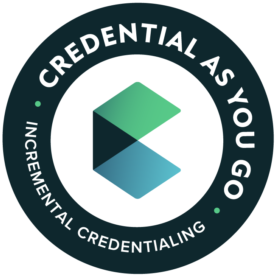Because incremental credentialing is a new approach to education and training, it is imperative to communicate these changes to a broad array of stakeholders. These stakeholders include learners, employers, college and university faculty and advisors, policymakers, quality assurance entities, and others. All of these audiences will want to know whether incremental credentials are credible, of high quality, and can help those who acquire them reach their education and career goals. In many cases, they also want to know how these credentials already fit within traditional education and training systems. Communications and marketing efforts can help convey these messages to defined audiences. The first step, therefore, is to define your audience.
An institution’s or organization’s audience for specific incremental credentials or programs often includes:
To define these audiences, go “granular” by documenting a range of descriptors for them. For instance, list your audience’s job roles, top priorities, motivation, needs, objectives, media consumption practices, research methods, trusted resources, and budget and purchasing processes. When considering individuals within audiences, it may be useful to document their likes and dislikes, habits and skills, education levels, and demographic information.
The more clearly and specifically you define your audiences, the better able you’ll be to create communications and marketing efforts that speak effectively to them. In the template described in Step 1, include an initiative that focuses on outreach to specific audiences.

Credential As You Go has acquired three phases of funding to date. Lumina Foundation funded Phase I, resulting in the Incremental Credential Framework for testing. The Institute of Education Sciences, U.S. Department of Education funds Phase II (Grant R305T210063), which focuses on rapid prototyping of and research on incremental credentials with a national campaign. An anonymous private donor fund at the Program on Skills, Credentials & Workforce Policy at George Washington University funds the development of the prototype Learn and Work Ecosystem Library. Walmart funds Phase III, which focuses on systems change for expansion and sustainability of incremental credentials. The opinions expressed are those of the authors and do not represent views of Lumina Foundation, Institute of Education Sciences, the U.S. Department of Education, Walmart, or George Washington University.